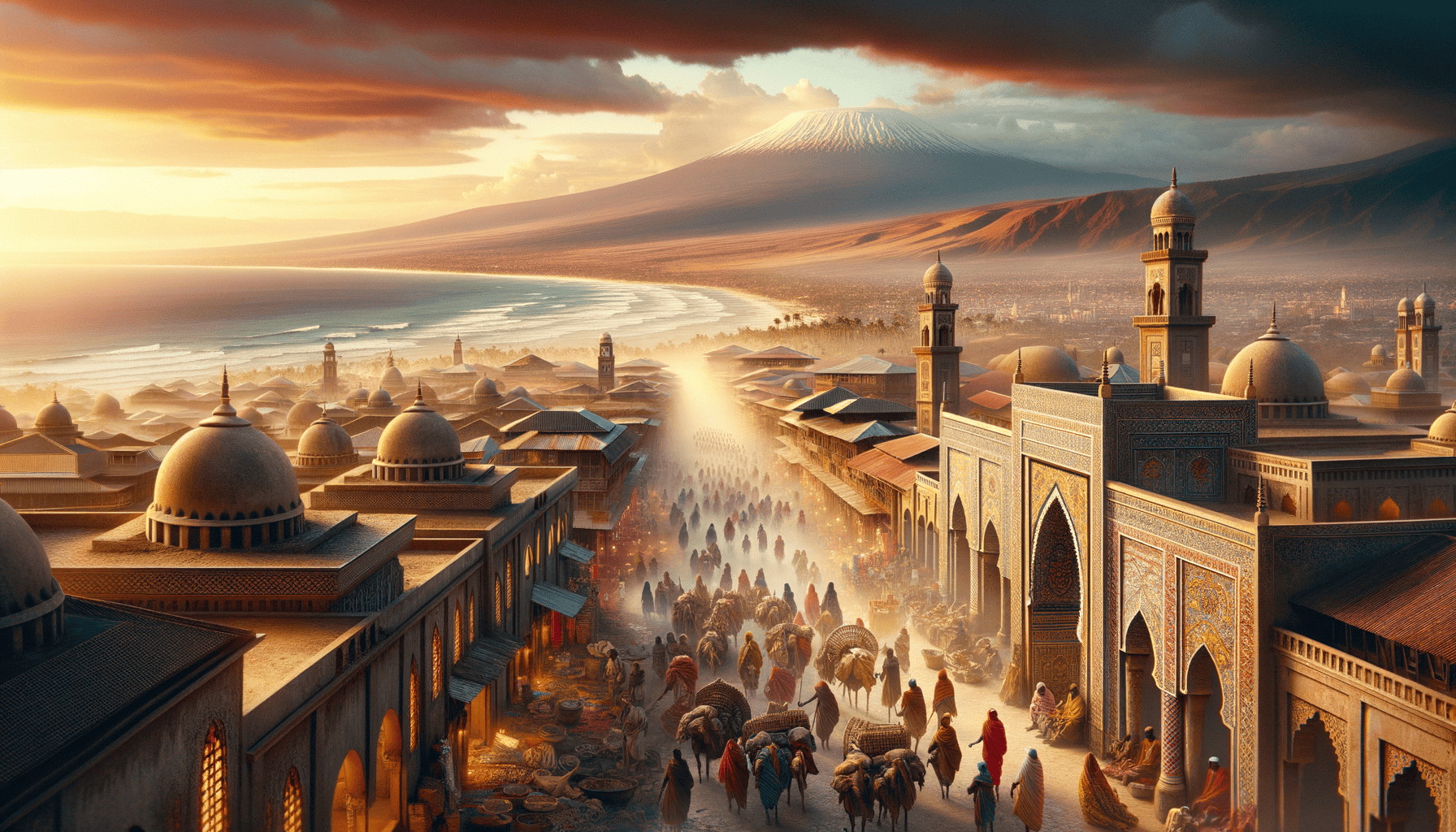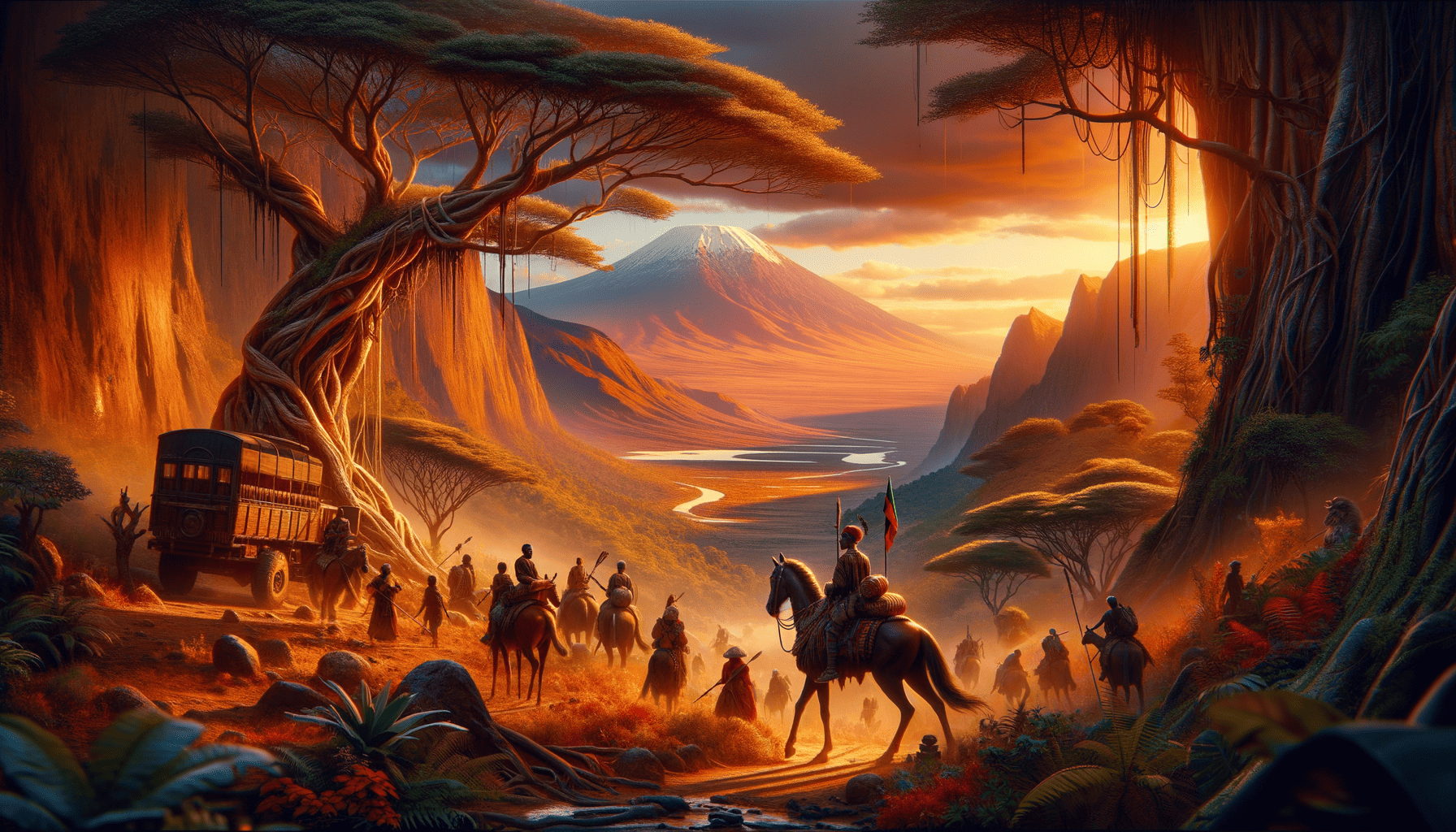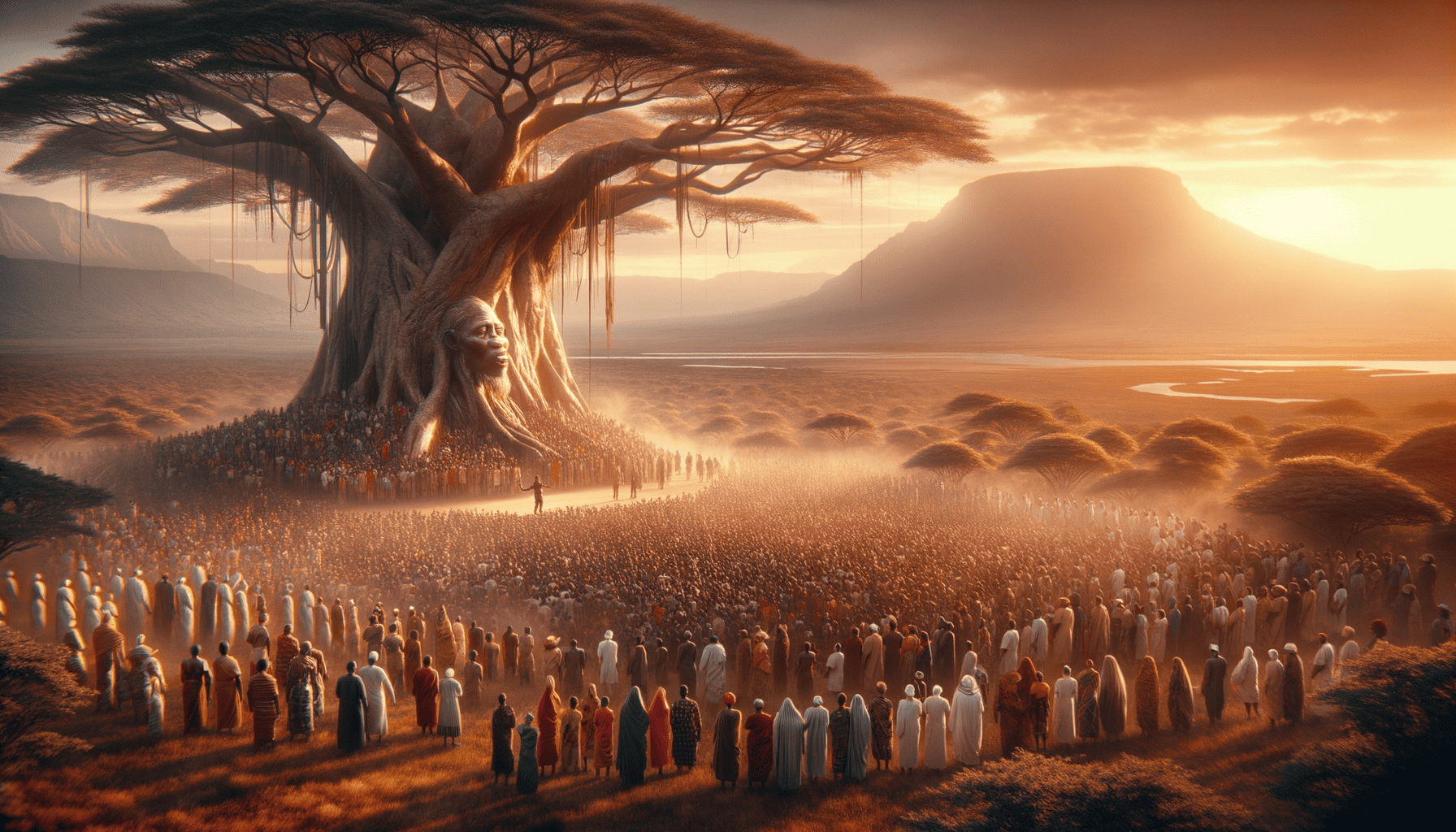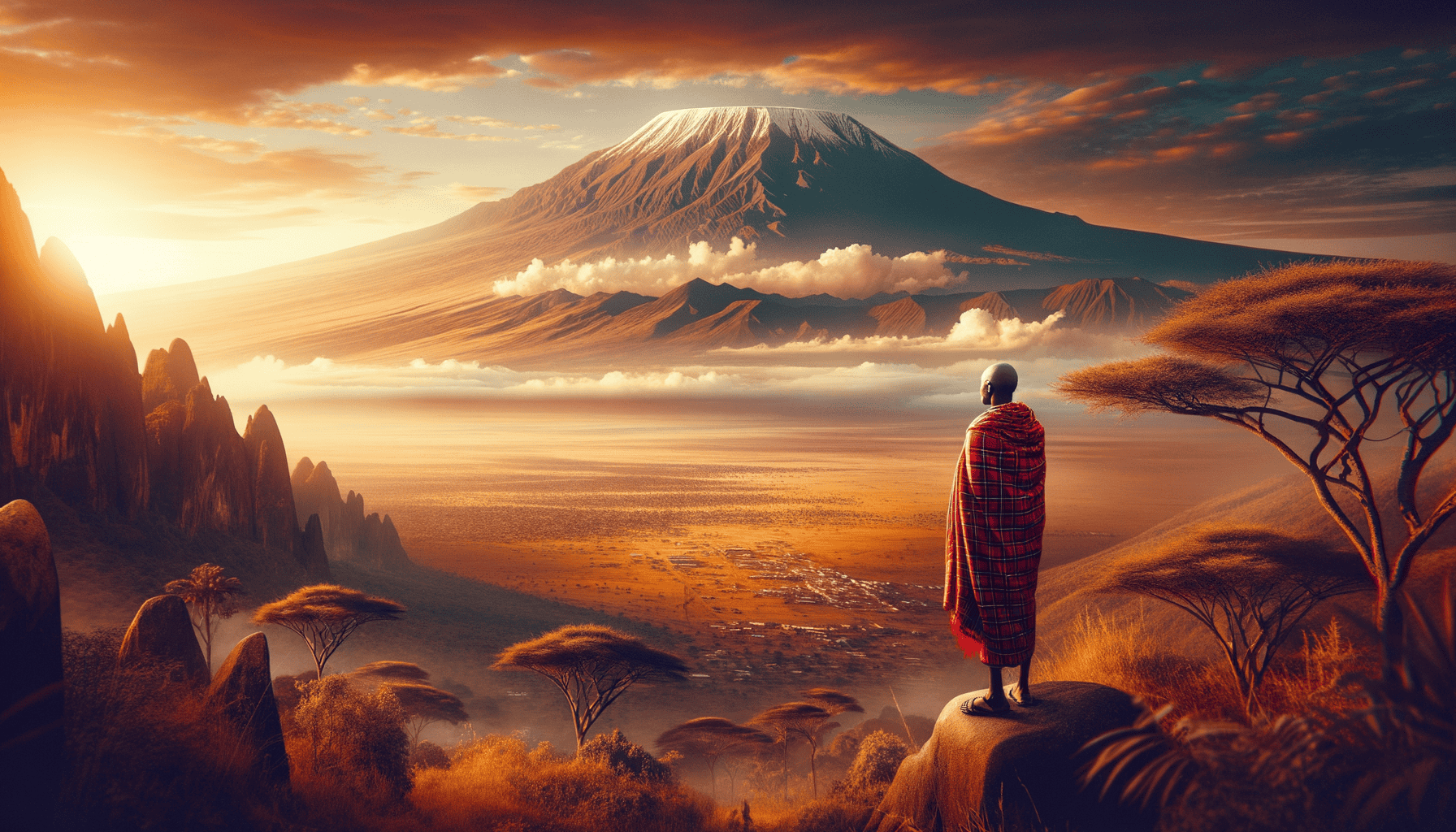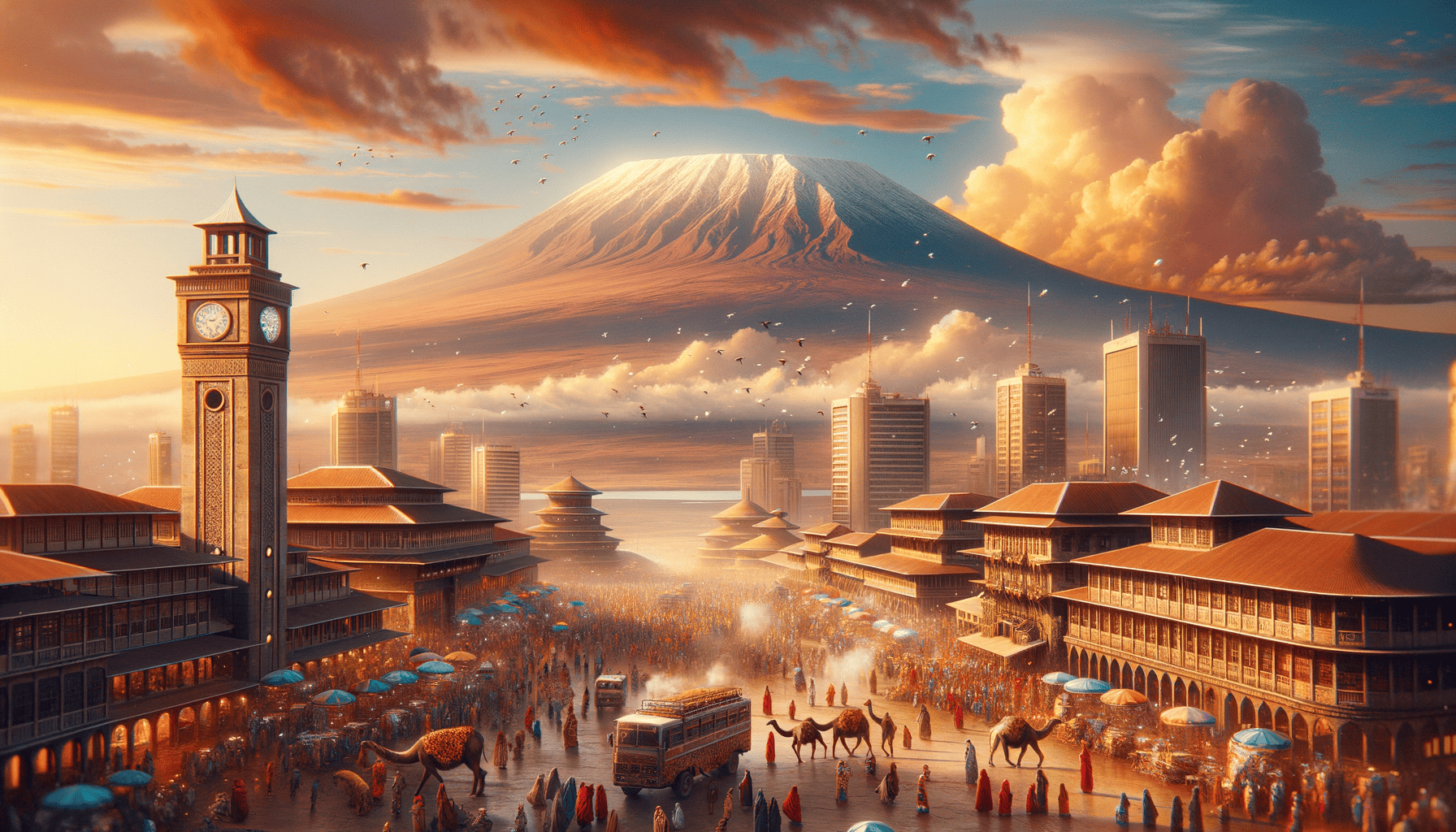Ancient Footprints in Olduvai Gorge
Deep in the heart of East Africa lies a special place called Olduvai Gorge. It's a magical canyon where scientists found the oldest human footprints ever! Let's travel back in time to see where our story began.
Little Amara stands at the edge of the gorge with her grandfather, their feet kicking up red dust in the morning sun. Her eyes grow wide as she looks down at the deep canyon below.
"Babu," she says to her grandfather, "tell me about the old people who lived here!"
Babu smiles and points to the layers of rock in the canyon walls. "Each layer tells a story, little one. Like pages in a giant book made of stone."
The First People
Long, long ago – even before your great-great-great grandparents were born – the first people walked these lands. They were different from us, but they were our family too!
Scientists found their bones here, buried deep in the ground. These ancient people were short and walked on two legs, just like we do. They made simple tools from stones to help them survive.
"They lived in groups and helped each other," Babu explains. "They hunted animals together and gathered fruits and plants to eat."
Life in Ancient Times
The land looked very different back then. Where we see dry grasslands today, there were once big lakes and green forests. Many animals lived here:
• Elephants bigger than the ones we see today
• Giant baboons that could be as tall as people
• Lions and leopards hunting their prey
• Giraffes stretching their long necks to eat leaves
Making Discoveries
Amara sits on a rock, imagining the ancient world. "How do we know all this, Babu?"
Her grandfather picks up a piece of old bone from the ground. "Because brave scientists like Mary and Louis Leakey spent years digging here. They found tools, bones, and footprints that told us about our ancestors."
A Living Museum
Today, Olduvai Gorge is like a big outdoor museum. People come from all over the world to see where humans first began. Scientists are still finding new things here!
"Look!" Amara points to something in the dirt. It's an old stone tool, smooth and worn by time.
Babu nods proudly. "This is why we protect this place. It tells us where we came from and helps us understand who we are."
The sun climbs higher in the sky as Amara and her grandfather walk along the gorge's edge. She holds her grandfather's hand tightly, feeling connected to all the people who walked here before her.
"We are part of a very old story," Babu says softly. "And it began right here, in this special place."
The Rise of Coastal Trading Kingdoms
The warm waves of the Indian Ocean splash against the shores of Tanzania. Here, a magical story of trade and friendship between different people began many years ago.
Young Juma stands at the busy port of Kilwa, watching big wooden ships with white sails glide into the harbor. His eyes sparkle with excitement as he sees traders from far-away lands step onto the docks.
A City of Gold and Stories
“Look, Papa!” Juma points to a ship. “Where does that one come from?”
His father, a local merchant, smiles. “That ship sailed all the way from Arabia, carrying spices and silk. And see those golden coins? They come from lands far across the sea.”
• Gold from Africa
• Spices from India
• Beautiful cloths from Arabia
• Shiny pearls from the ocean
The Birth of Swahili Culture
As ships came and went, something amazing happened. The people of Tanzania’s coast began mixing their ways of life with visitors from other lands. They created something new and special – the Swahili culture!
“Papa, why do some traders speak differently?” Juma asks, listening to the various languages around him.
“That’s how our Swahili language was born,” his father explains. “It’s like making soup – we took words from Arabic, Persian, and our local languages to create something delicious and new!”
Beautiful Cities by the Sea
Along the coast, beautiful cities grew up. Their buildings were made of coral stone that sparkled in the sun. People built grand mosques with tall doors carved from wood, and houses with cool courtyards inside.
Life in the Trading Cities
Juma loves walking through the busy streets with his father. They pass by:
Cooks making tasty foods with spices from India
Tailors sewing beautiful clothes from colorful fabrics
Craftspeople making pretty jewelry from gold and silver
Artists carving designs in wooden doors
Stories from the Sea
“Tell me a sailor story, Papa!” Juma begs as they sit watching the sunset over the harbor.
His father points to a distant ship. “Many years ago, a sailor named Ibn Battuta visited our city. He wrote about how beautiful and rich Kilwa was, with houses made of coral stone and markets full of treasures.”
But changes were coming to Tanzania’s shores. New visitors would arrive from far across the ocean, bringing both challenges and opportunities to these peaceful trading kingdoms…
Winds of Change and Courage
The year was 1884, and life in Tanzania was about to change. The peaceful sound of waves hitting the shore would soon be joined by the marching of new boots on African soil.
Young Amina sat under a baobab tree, listening to her grandmother’s stories. The old tales of trading ships and friendly merchants were giving way to new, uncertain times.
The Day Everything Changed
“Bibi (Grandmother), why are there so many new people in our village?” Amina asked, watching strangers in strange clothes walk through their streets.
Her grandmother’s eyes grew serious. “They are here to rule our land, little one. But remember – our people are strong like this baobab tree. Our roots go deep.”
Brave Hearts Stand Tall
A brave leader named Chief Mkwawa stood up to protect his people. He was like a lion protecting his pride. Many others joined him:
• Chief Mkwawa
• The Maji Maji fighters
• Brave village leaders
• Strong community members
The Story of Maji Maji
“What happened next, Bibi?” Amina leaned closer.
“Our people came together in a big movement called Maji Maji. They believed special water would protect them from harm. Even though their magic water didn’t work, their bravery showed how much they loved their land.”
Life Under New Rules
Things changed in Tanzania:
New schools were built
Big trains started running through the land
People had to grow different crops
Many families had to move to new places
Keeping Culture Alive
“How did our people stay strong, Bibi?” Amina asked, playing with her beaded necklace.
“We kept telling our stories,” her grandmother smiled. “We sang our songs, danced our dances, and spoke our languages. No one could take that away from us.”
Seeds of Freedom
As the sun set behind the baobab tree, Amina’s grandmother spoke softly: “During these hard times, something new began to grow – like a tiny seed becoming a mighty tree. Our people started dreaming of freedom.”
The story of Tanzania was changing, but it wasn’t over. A new chapter was about to begin, one where brave leaders would step forward to guide their people toward independence…
Dreams of Freedom Take Flight
The year was 1954, and something special was happening in Tanzania. A teacher named Julius Nyerere had a big dream – to make Tanzania free!
A Special Teacher’s Dream
Julius Nyerere wasn’t just any teacher. He was like a wise owl who knew exactly what Tanzania needed. He said to his friends, “Our land should belong to us again!”
Making Friends, Building Hope
Mwalimu Nyerere traveled all around Tanzania. He was like a busy bee, going from village to village. He talked to farmers, teachers, and workers. He made them all feel like one big family.
“When we work together,” he would say, “we are strong like a bundle of sticks. One stick breaks easily, but many sticks together are unbreakable!”
The Magic Word: Ujamaa
Nyerere taught everyone about something called “Ujamaa.” It means “family-hood” in Swahili. His idea was simple:
• Sharing what we have
• Helping each other
• Working together
• Being like one big family
Dancing Toward Freedom
All across Tanzania, people started getting excited about freedom. They sang songs and danced in the streets. Even children joined in!
“Uhuru! Uhuru!” they would shout. That means “Freedom! Freedom!”
A New Flag Rises
In 1961, something amazing happened. Tanzania got its very own flag!
Green = Our beautiful land
Gold = Our natural riches
Black = Our people
Blue = Our lovely ocean
Building a New Tanzania
After becoming free, Tanzania had lots of work to do. Mwalimu Nyerere said, “Let’s build our country together!”
People started:
Building more schools
Making new hospitals
Growing food together
Helping their neighbors
A Special Kind of Leader
Nyerere was different from other leaders. He lived simply and always thought about helping others. He was like a shepherd taking care of his flock.
The story of independence wasn’t just about one person. It was about millions of Tanzanians working together, like stars in the night sky, each one shining bright but together making something truly beautiful. ✨
Land of Natural Wonders
Tanzania is like a giant treasure box filled with amazing sights! From tall mountains to wide plains, this beautiful country has so much to share.
The Mighty Kilimanjaro
Have you ever seen a mountain wearing a white snow hat? That’s Mount Kilimanjaro! It’s the tallest mountain in all of Africa.
The Amazing Serengeti
Imagine a place where lions play and zebras dance! That’s the Serengeti. It’s like a huge animal city where everyone has a special job.
“Look!” whispers little Juma to his sister. “The wildebeest are moving again!” Every year, millions of animals travel across the Serengeti looking for food and water. It’s like a big animal parade!
Meeting Tanzania’s Families
Tanzania is home to many different groups of people. They’re like beautiful flowers in one big garden. Each group has its own special:
• Stories and clothes
• Foods and celebrations
• Ways of saying “hello”
The Jumping Warriors
The Maasai people are famous for their amazing jumping dance. They wear bright red clothes and can jump so high it looks like they’re flying!
Zanzibar’s Special Spice Gardens
Off the coast of Tanzania lies Zanzibar, an island that smells like a magical kitchen!
Here you can find:
Sweet cinnamon trees
Spicy clove plants
Vanilla vines
Fragrant flowers
Protecting Nature’s Gifts
Tanzanians work hard to keep their beautiful land safe. They’re like nature’s guardians!
The Great Lakes
Tanzania has three huge lakes! Lake Victoria is so big it looks like an ocean. Lake Tanganyika is home to colorful fish that can’t be found anywhere else in the world.
Living Together in Peace
Different animals, plants, and people all share Tanzania’s wonderful land. They’re like pieces of a beautiful puzzle, each one special and important.
At night, under the African stars, you can hear the sounds of Tanzania’s natural symphony – lions roaring in the distance, elephants trumpeting hello, and people singing their favorite songs. It’s a magical place where every day brings new adventures! ✨
Building Tomorrow’s Tanzania
The sun rises over modern Tanzania, painting the sky in beautiful colors. The country has grown from its ancient roots into a place where old and new dance together.
Cities That Touch the Sky
In Dar es Salaam, Tanzania’s biggest city, tall buildings shine in the sunlight. Little Amara looks up in wonder. “Mama, our city is growing taller every day!” she says with a big smile. ️
Learning and Growing
In schools across Tanzania, children learn on computers while also hearing stories from their grandparents. “We keep our traditions while learning new things,” says Teacher Zawadi.
Young minds are blooming like flowers in the sunshine:
• Learning about computers
• Speaking many languages
• Solving big problems
Friends Around the World
Tanzania makes friends with countries everywhere! They share:
Yummy foods
Beautiful art
Happy music
Smart ideas
Green Dreams Growing
Tanzanians are working hard to keep their country clean and green. Solar panels catch the sun’s power, while wind turbines spin like giant pinwheels in the breeze. ☀️
Making Things at Home
Factories buzz with activity as Tanzanians make their own clothes, food, and toys. “Now we can create wonderful things right here,” smiles factory worker Baba Mohammed.
Helping Each Other Grow
Communities work together like busy bees in a hive. When someone needs help, neighbors come running. It’s the Tanzanian way!
Dreams for Tomorrow
Young Tanzanians dream big dreams. Some want to be doctors, others want to be teachers, and some dream of being astronauts!
The story of Tanzania continues to grow, like a mighty baobab tree reaching for the stars. From the footprints in Olduvai Gorge to the footsteps on modern city streets, Tanzania shows us that amazing things happen when people work together and dream big.
As the sun sets over Mount Kilimanjaro, little Amara whispers, “Goodnight, Tanzania. Tomorrow will bring more adventures!” And just like that, another chapter in Tanzania’s beautiful story begins. ✨


